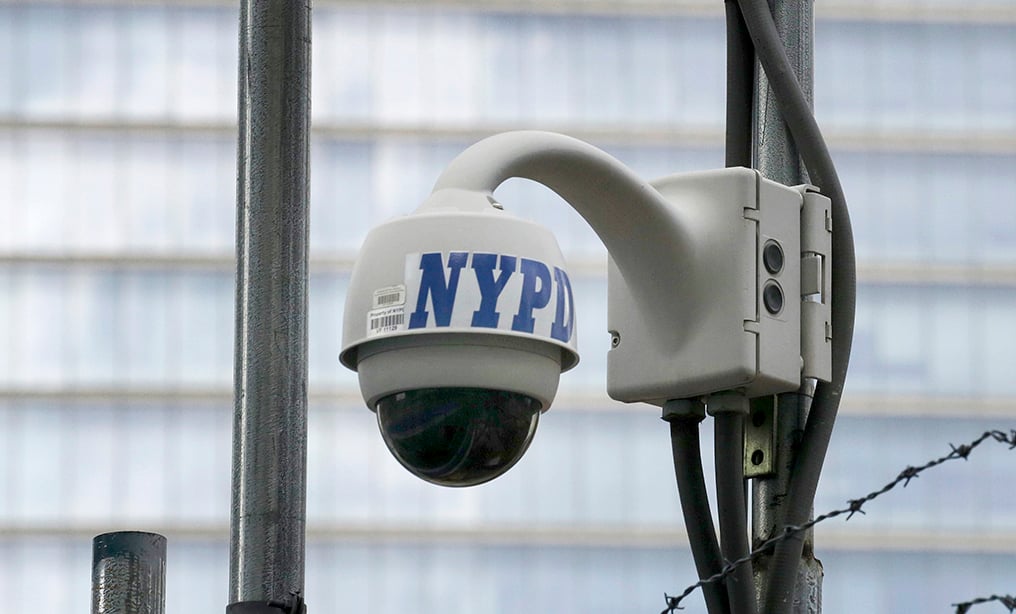NY State Senate Bill Would Ban Police Use of Facial Recognition Technology
The bill would also create a task force to examine how to regulate biometric technology in the future, with seats reserved for the state police and the New York City Police Department, among other agencies.
January 27, 2020 at 02:36 PM
4 minute read
 New York Police Department security camera at the National September 11 Memorial and Museum in Manhattan. Photo: Mark Lennihan/AP
New York Police Department security camera at the National September 11 Memorial and Museum in Manhattan. Photo: Mark Lennihan/AP
A new bill in the New York State Senate would prevent police from using facial recognition technology and some other kinds of biometric surveillance while creating a task force to research future use of the technology.
The bill, introduced Monday by State Sen. Brad Hoylman, D-Manhattan, would still allow police and other law enforcement officials to use DNA and fingerprints to identify people and link them to potential crimes.
But Hoylman, who chairs the New York State Senate Judiciary Committee, said newer biometric technology such as facial recognition "presents a chilling threat to our privacy and civil liberties."
"Facial recognition technology threatens to end every New Yorker's ability to walk down the street anonymously," he said in a statement.
Hoylman cited research showing that facial recognition algorithms struggle to recognize women, people of color, young people and transgender or gender nonconforming people.
Lawyers at The Legal Aid Society and the New York Civil Liberties Union praised the proposal, saying that the technology is inaccurate and easily abused.
"This legislation provides critical protections for New Yorkers against harmful and discriminatory technologies that do little more than subject communities of color to wrongful targeting, interrogation, detention and conviction," NYCLU lead policy counsel Michael Sisitzky said in a statement.
The bill would also create a task force to examine how to regulate biometric technology in the future, with seats reserved for state police and the New York City Police Department, among other agencies.
Hoylman said he was specifically concerned by the NYPD's use of facial recognition and an app created by Clearview AI, which searches internet images to help law enforcement identify people.
The bill was introduced about a week after the New York Times published a major report raising concerns about Clearview called "The Secretive Company That Might End Privacy as We Know It."
The article questioned whether the app's capabilities have been appropriately audited. A Clearview spokeswoman said Monday that the company is not releasing the names of people on an "independent panel of experts" that has evaluated the app, according to the Clearview website.
Tor Ekeland, outside counsel for Clearview, said the company welcomes more conversation on the responsible use of facial recognition technology, although he had some concerns about the broad wording of Hoylman's bill.
The Clearview app is only available to law enforcement users, not the general public. Ekeland, whose firm, Tor Ekeland Law PLLC, is based in Brooklyn, said the company wants to keep its technology out of the hands of bad actors.
An NYPD spokeswoman said in a statement that it would be negligent if the department didn't use facial recognition technology.
"The NYPD identifies suspects by comparing a still image from a surveillance video to a pool of lawfully possessed arrest photos and this technology helps bring justice to victims," the statement said. "A facial recognition match is solely a lead — no one has ever been arrested solely on the basis of a computer match, no matter how compelling."
She added that the department has not yet reviewed the specific language of the bill.
READ MORE:
Why 4 Local Governments Banned Facial Recognition Tech
Coming Face-to-Face With Facial Recognition Technology
No Turning Back: New Facial Recognition Database May Force Legal Reckoning
This content has been archived. It is available through our partners, LexisNexis® and Bloomberg Law.
To view this content, please continue to their sites.
Not a Lexis Subscriber?
Subscribe Now
Not a Bloomberg Law Subscriber?
Subscribe Now
NOT FOR REPRINT
© 2025 ALM Global, LLC, All Rights Reserved. Request academic re-use from www.copyright.com. All other uses, submit a request to [email protected]. For more information visit Asset & Logo Licensing.
You Might Like
View All
Class Certification, Cash-Sweep Cases Among Securities Litigation Trends to Watch in 2025
6 minute read
Health Care Data Breach Class Actions Saw December Surge in NY Courts

AI Startup Founder Defrauded Investors of Millions, US Prosecutors Say
3 minute read
Legal Leaders See AI's Multitude of Uses as Both Blessing and Curse
Trending Stories
Who Got The Work
J. Brugh Lower of Gibbons has entered an appearance for industrial equipment supplier Devco Corporation in a pending trademark infringement lawsuit. The suit, accusing the defendant of selling knock-off Graco products, was filed Dec. 18 in New Jersey District Court by Rivkin Radler on behalf of Graco Inc. and Graco Minnesota. The case, assigned to U.S. District Judge Zahid N. Quraishi, is 3:24-cv-11294, Graco Inc. et al v. Devco Corporation.
Who Got The Work
Rebecca Maller-Stein and Kent A. Yalowitz of Arnold & Porter Kaye Scholer have entered their appearances for Hanaco Venture Capital and its executives, Lior Prosor and David Frankel, in a pending securities lawsuit. The action, filed on Dec. 24 in New York Southern District Court by Zell, Aron & Co. on behalf of Goldeneye Advisors, accuses the defendants of negligently and fraudulently managing the plaintiff's $1 million investment. The case, assigned to U.S. District Judge Vernon S. Broderick, is 1:24-cv-09918, Goldeneye Advisors, LLC v. Hanaco Venture Capital, Ltd. et al.
Who Got The Work
Attorneys from A&O Shearman has stepped in as defense counsel for Toronto-Dominion Bank and other defendants in a pending securities class action. The suit, filed Dec. 11 in New York Southern District Court by Bleichmar Fonti & Auld, accuses the defendants of concealing the bank's 'pervasive' deficiencies in regards to its compliance with the Bank Secrecy Act and the quality of its anti-money laundering controls. The case, assigned to U.S. District Judge Arun Subramanian, is 1:24-cv-09445, Gonzalez v. The Toronto-Dominion Bank et al.
Who Got The Work
Crown Castle International, a Pennsylvania company providing shared communications infrastructure, has turned to Luke D. Wolf of Gordon Rees Scully Mansukhani to fend off a pending breach-of-contract lawsuit. The court action, filed Nov. 25 in Michigan Eastern District Court by Hooper Hathaway PC on behalf of The Town Residences LLC, accuses Crown Castle of failing to transfer approximately $30,000 in utility payments from T-Mobile in breach of a roof-top lease and assignment agreement. The case, assigned to U.S. District Judge Susan K. Declercq, is 2:24-cv-13131, The Town Residences LLC v. T-Mobile US, Inc. et al.
Who Got The Work
Wilfred P. Coronato and Daniel M. Schwartz of McCarter & English have stepped in as defense counsel to Electrolux Home Products Inc. in a pending product liability lawsuit. The court action, filed Nov. 26 in New York Eastern District Court by Poulos Lopiccolo PC and Nagel Rice LLP on behalf of David Stern, alleges that the defendant's refrigerators’ drawers and shelving repeatedly break and fall apart within months after purchase. The case, assigned to U.S. District Judge Joan M. Azrack, is 2:24-cv-08204, Stern v. Electrolux Home Products, Inc.
Featured Firms
Law Offices of Gary Martin Hays & Associates, P.C.
(470) 294-1674
Law Offices of Mark E. Salomone
(857) 444-6468
Smith & Hassler
(713) 739-1250






